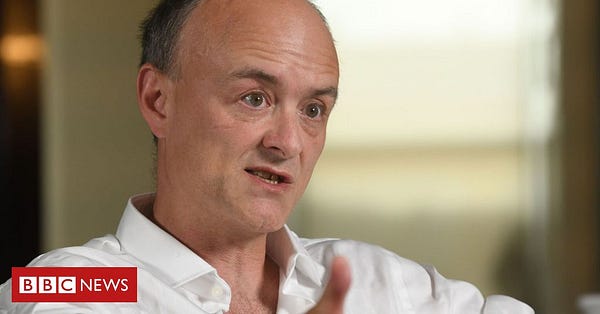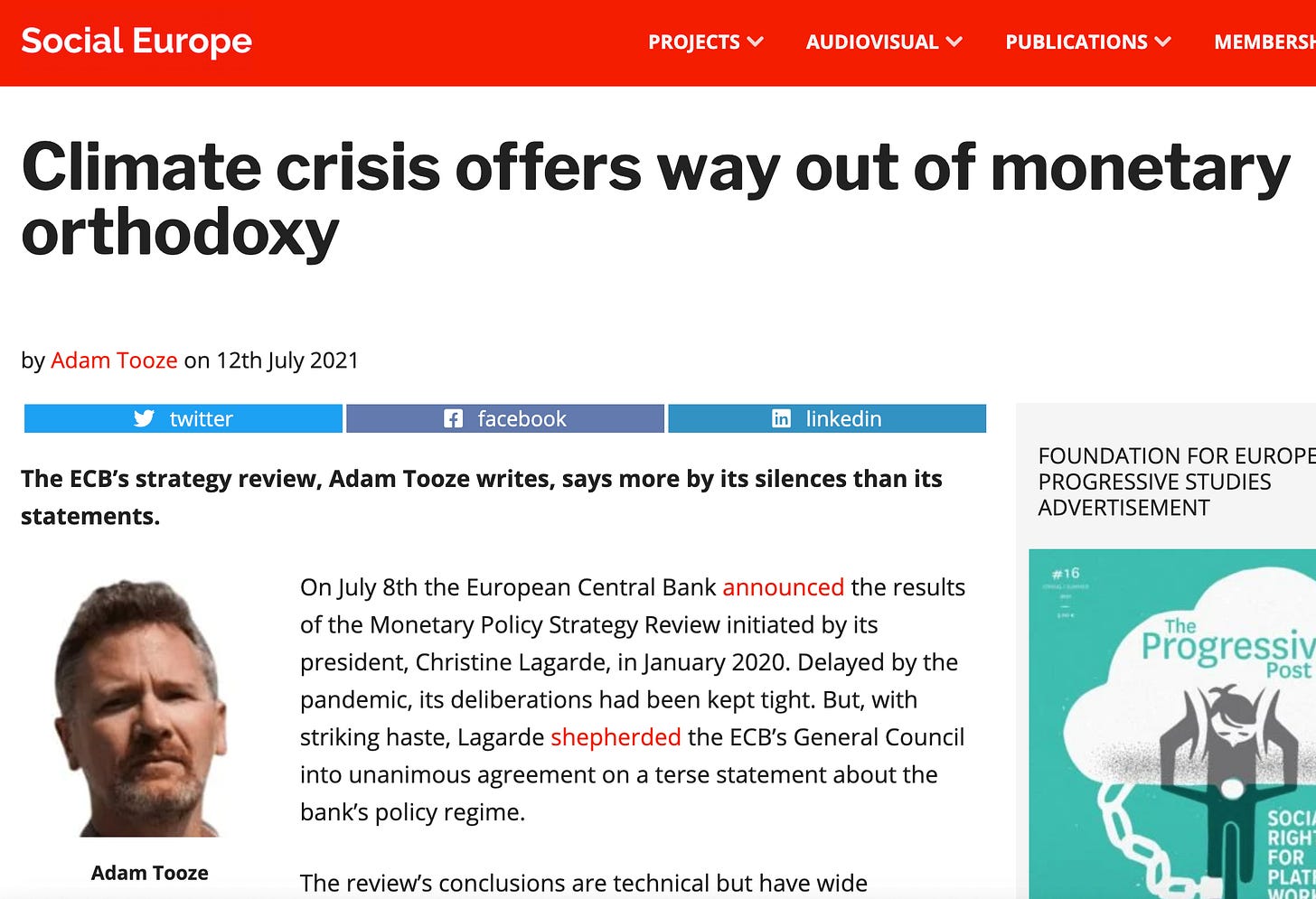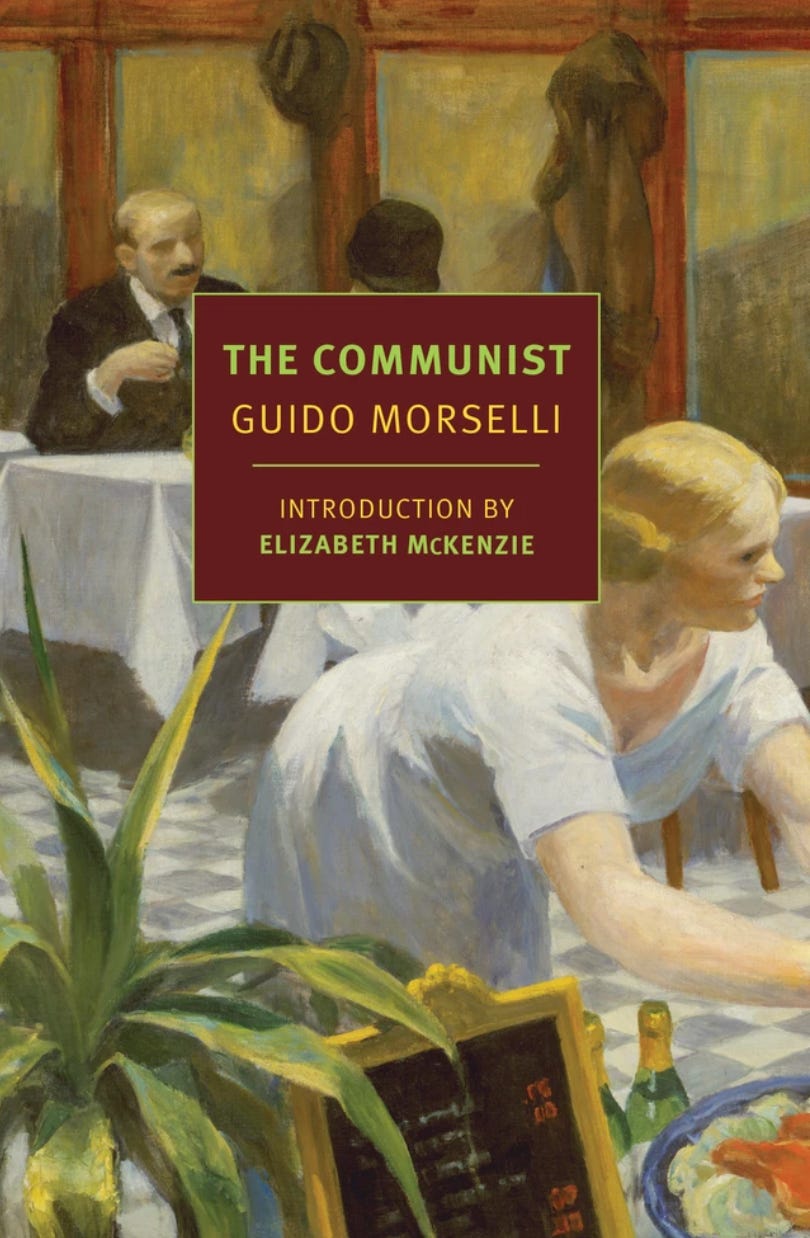Top Links #2 Reading suggestions from Adam Tooze
ECB, Guido Morselli and THAT Cummings clip. The regular list of links, exclusive for supporters of Chartbook Newsletter.
Hi all,
I’m grateful that so many people are showing their support for Chartbook Newsletter by signing up as paying subscribers. Thank you!
To broaden and deepen that community, for paying subscribers, I am going to do regular posts that bring together interesting reading, podcasts and other links. They are called Top Links.
From August, the Top Links feed will be exclusive for paying subscribers. If you would like to join the Chartbook supporters, hit the button below.
Top Links #1 was very well received.
So, here, somewhat sooner than I anticipated, is Top Links #2.
*********
The urgency to get Top Link # 2 out, is all about the timetable of European Central Bank monetary policy. Yup. That’s the way we roll ….
On Thursday 22nd July the ECB will announce fresh guidance on how it intends to implement the new monetary policy Strategy it recently announced. The inflation target now is 2 percent. No more. No less. Given Europe’s recent record of lowflation that will be a challenge.
Last week I discussed the political logic of the ECB’s Strategic Review in this column for Social Europe.
Social Europe is a great place to check out progressive, political and social science writing on Europe.
There is little doubt that Europe needs more stimulus push. This piece by Christian Odendahl of the CER is a wonderfully lucid exposition of the case for Europe to follow the USA in running a “high pressure economy”. @COdendahl is a GREAT twitter follow on all things European economy.
Odendahl expands on argument made in this typical punchy essay by Mark Blyth in the Guardian. Mark ends with a bang: “beware the rhetoric of inflationary reaction. A perversity thesis joined to naked self-interest should not guide policy, no matter how hard it is to get that folk model out of our heads.”
Stefan Eich strikes a reflective note in his elegant essay on the question of central bank independence - “Independent from What?” - for the excellent website Just Money.
As Stefan remarks, about recent historical writing on central banks: “This longer and altogether more political history serves as an important reminder that the status of central banks is not primarily a technical or even an economic question, but one that touches on fundamental questions of constitutional rule, as well as our conception of democracy and our theory of the modern state as both an agent and a site of contemporary capitalism. All these strands converge, I want to suggest, in the question: independence from what?”
Stefan’s new book on political theory and money is forthcoming from Princeton in 2022.
Back to this week! For a good explanation of what is at stake in the ECB’s announcement on Thursday, see this FT piece. Anticipating more sustained intervention by the ECB in pursuit of their 2 percent inflation target, demand for European bonds has rallied and yields have fallen.
***********
Having finished Shutdown a few months ago, I have been coaxed myself back into a regular habit of reading fiction. It has been a long time. I do tend to prefer stuff with a historical/political angle.
I just finished this by Guido Morselli.
https://www.nyrb.com/products/the-communist-1?variant=31044721991
The blurb from the NYRB is good:
“Walter Ferranini has been born and bred a man of the left. His father was a worker and an anarchist; Walter himself is a Communist. In the 1930s, he left Mussolini’s Italy to fight Franco in Spain. After Franco’s victory, he left Spain for exile in the United States. With the end of the war, he returned to Italy to work as a labor organizer and to build a new revolutionary order. Now, in the late 1950s, Walter is a deputy in the Italian parliament.
He is not happy about it. Parliamentary proceedings are too boring for words: the Communist Party seems to be filling up with ward heelers, timeservers, and profiteers. For Walter, the political has always taken precedence over the personal, but now there seems to be no refuge for him anywhere. The puritanical party disapproves of his relationship with Nuccia, a tender, quizzical, deeply intelligent editor who is separated but not divorced, while Walter is worried about his health, haunted by his past, and increasingly troubled by knotty questions of both theory and practice. Walter is, always has been, and always will be a Communist, he has no doubt about that, and yet something has changed. Communism no longer explains the life he is living, the future he hoped for, or, perhaps most troubling of all, the life he has led.”
Its downbeat, low-key stuff. But it is fascinating about the culture of the Italian Communist Party in the phase of de-Stalinization and fascinating as a character sketch of a party man wrestling with his faith and his own critical understanding and experience of reality.
******
One of my favorite podcast listens of the last few weeks was Jordan Schneider’s China Talk session about solar power. They didnt go too deep on the forced labour issue. But the info here on polysilicates was outstanding.
*******
Top of the weird list for this issue is definitely this snippet from the BBC interview with the ghastly Dominic Cummings. His explanation of his plan to oust Boris Johnson as British PM just days after his 2019 election victory, is extraordinary. It’s like a demented schoolboy playing at “Machiavel” with the characteristic shoulder-shrugging cynicism of “well that’s just politics”.


******
In Top Links # 1 I invited readers to suggest reading and links that might appeal to the group. To my delight, several obliged with great suggestions.
Dziga Lumière suggested this haunting piece in New Lines Magazine, a publication I really like, on an opposition fighter in Syria. “The Philosopher’s Wine. Between the euphoria of revolution and the despair of exile, a Syrian finds solace in Sadiq Jalal al-Azm’s wine”. Brilliant writing by Nick Foretek.
Robin Sloan made a wonderful sounding suggestion: “As someone who has never really been able to make time or space for podcasts, my continued engagement with John Zhu's rollicking retelling of Water Margin (a.k.a. Outlaws of the Marsh, a.k.a. one of the Four Great Classical Novels of China) has been a surprise. The informality & looseness of his presentation is totally winning: http://www.outlawsofthemarsh.com/
I havent had the chance to check this out yet, but it sounds fabulous.
Keep them coming.
And sign up.
A bientôt.
AT





Great suggestions! In the topic of fiction readings for the summer (with a light political/historical angle), A Gentleman in Moscow by Amor Towles is a great read:
https://www.goodreads.com/book/show/34066798-a-gentleman-in-moscow
"A Gentleman in Moscow immerses us in another elegantly drawn era with the story of Count Alexander Rostov. When, in 1922, he is deemed an unrepentant aristocrat by a Bolshevik tribunal, the count is sentenced to house arrest in the Metropol, a grand hotel across the street from the Kremlin. Rostov, an indomitable man of erudition and wit, has never worked a day in his life, and must now live in an attic room while some of the most tumultuous decades in Russian history are unfolding outside the hotel’s doors. Unexpectedly, his reduced circumstances provide him a doorway into a much larger world of emotional discovery."